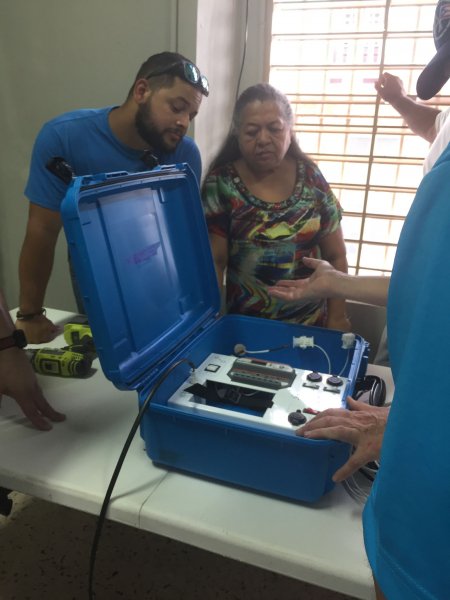At a glance
A pair of Alfred State College faculty members made a powerful difference recently when they helped install sustainable solar devices for Puerto Rican communities in need.

A pair of Alfred State College faculty members made a powerful difference recently when they helped install sustainable solar devices for Puerto Rican communities in need.
Late last month, Dr. Alex Bitterman, professor and chair of the Architecture and Design Department, and Erin Vitale, professor and chair of the Civil Engineering Technology Department, traveled to Puerto Rico to collaborate with SUNY Chancellor Kristina M. Johnson on a project with We Care/We Share Solar. This organization conducts solar suitcase installation programs, which provide highly efficient solar energy systems to communities without reliable electricity. The suitcases power medical lighting, mobile communication, and essential medical devices.
Johnson was volunteering as part of the “NY Stands with Puerto Rico Recovery and Rebuilding” initiative set forth by Gov. Andrew Cuomo. While in Puerto Rico, the State University of New York chancellor helped install sustainable solar technology, volunteered with SUNY students at three separate All Hands and Hearts worksites, and signed a system-level Memorandum of Understanding (MOU) for academic collaboration between SUNY and the University of Puerto Rico (UPR).
Vitale noted that she and Bitterman witnessed the signing of the MOU on Thursday of the trip. Then on Friday, they helped install a solar panel and a solar suitcase at Programma de Apoyo y Enlace Communitario, Inc. (PAEC) – a community center in Aguada – and also presented a solar suitcase and portable solar panel to UPR to use for community demonstrations and teaching purposes. On Saturday, they installed a solar panel and a solar suitcase at the UPR Cayey campus in the town of Cayey.
While in Puerto Rico, the two Alfred State professors met one particular woman who had a profound impact on them: Maria Hernandez, director of the PAEC community center in Aguada. According to Bitterman, the PAEC building was the only one in the area that had had power for four months because of its generator.
As a result, Bitterman said, Hernandez was faced with making tough decisions every day about how to use the limited power available, whether for charging cellphones to call out for help and supplies, or for life-sustaining support equipment such as dialysis machines and nebulizers.
“When we powered up the solar suitcase, the look on her face was like, ‘Wow, it works,’ but it was also like, ‘Wow I’m never again going to have to make that terrible choice on a daily basis. We now have enough power that we can always power cellphones and have some left over, even with the generator, to use for emergency or critical-use kinds of things,’” Bitterman said. “So, I think the initial goal of the trip was being trained on how the solar suitcase works, the technology behind it, and the installation process, but the secondary goal that snuck up on me was the human component to all of that.”
Reflecting on the trip, Vitale said, “I was just sort of overwhelmed by being able to meet people in these communities, and I just felt blessed because if in any way I was part of relieving the stress of people such as Maria, then it was well worth it.”
Bitterman described the trip as the “opportunity of a lifetime” for him, both professionally and personally.
“I was absolutely blessed to have this opportunity, and really just very humbled by these folks who, for over a year, have really been struggling with not having power, not having resources, and their generosity and their genuineness in showing us their communities, their neighborhoods, and sharing food with us, and making lunch with us,” he said. “Everywhere we went, we had a homemade lunch, which, when you think about the fact that these people have had a tough time getting food and water and electric for like a year, the fact that they planned to make us lunch every day was very heartwarming and touching.”

